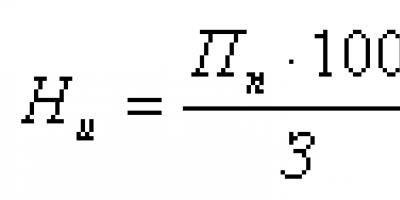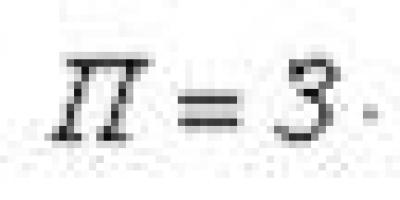So as not to miss new ones useful materials, subscribe to site updates
We often encounter situations where either we ourselves or our things become the object of action. For example, they do our hair, paint our nails, or fix something. You can talk about all these situations in English using one simple expression - have something done.
Using the have something done construction
Let's start by looking at two main cases in which this design is used:
- We are talking about a service that was provided to you at your request or for money.
Imagine that you had surgery in a clinic. It was successful, you were satisfied and now you tell your friend about it:
I had my surgery done in a very good clinic. – I had the operation in a very good clinic.
Had my surgery done indicates that you did not operate on yourself, but a doctor did it.
She had her window repaired after the storm. — She fixed the window after the thunderstorm.
Had her window repaired indicates that she hired someone to do it for her.
Something bad happened to you.
She had her store robbed last night. “Her store was robbed last night.”
We had all our money stolen. - All our money was stolen.
In spoken English, instead of have possible use of the verb get.
When will you get your hair done? - When will you get your hair done?
I have to pay to get this program installed. – I have to pay to have this program installed.
Scheme for forming sentences with the construction have something done
Statement
Subject + have/has ed or V3.
Alice has all her clothes made at the dressmaking shop. – Alice sews all her clothes in the studio.
Frank has his room cleaned twice a week. – Frank’s room is cleaned twice a week.
Subject + auxiliary verb with particle not + have+ object or person on whom the action is performed + verb ending - ed or V3.
Alice doesn't have all her clothes made at the dressmaking shop. – Alice doesn’t make all her clothes in a tailor shop.
Frank doesn’t have his room cleaned twice a week. Frank’s room is not cleaned twice a week.
Auxiliary verb + subject + have+ object or person on whom the action is performed + verb ending - ed or V3.
Does Alice have all her clothes made at the dressmaking shop? – Does Alice make all her clothes in the studio?
Does Frank have his room cleaned twice a week? – Is Frank’s room cleaned twice a week?
Examples of using the construction have something done
Expression have something done can be used at any time, as well as with turnover going to, modal verbs etc. In all cases, only the verb changes to have. The second part of the turnover remains unchanged.
The Causative: have something done.
In Russian, it’s so common to hear phrases like: I’ll go get my hair cut, or I’ve had my teeth treated, I’ve had my eyesight checked, and so on. And, of course, we understand that the speaker does not perform these actions independently, but attracts specialists: a hairdresser, a dentist, a doctor. It wouldn’t even occur to us that someone could cut their own hair or treat their own teeth, although the grammatical sentences imply exactly this, since they are formulated in the active voice.
In English everything is different. If you want to tell someone that you cut your hair, use the passive voice, not the active voice. For actions that are not performed by you, but by someone hired by you, the have something done construction is used. In English grammar this construction is called “The Causative”.
For example, you want to say that you cut your hair (get a haircut) every month. If you cut your own hair, you can state:
If you go to the hairdresser, the have something done construction is used. In English it will sound like this:
If you translate the construction “word for word”, you get: “I have my hair cut every month.” That is, I don’t cut them myself, but “have them cut”, someone else does it.
Now that you more or less understand the essence of the design, let's look at some more examples:
The two examples above are given in time Present Simple: These are habitual, repetitive actions. Remember that the verb have changes to has for the third person.
The Causative is usually used with verbs such as build, clean, decorate, deliver, mend, copy, print, repair, service, test, cut, check and others that imply that the action is performed by someone other than the speaker himself.
The Causative (have something done) consists of three parts. All parts of this design are changeable. Instead of done, you substitute any verb in the third form, something is an object, an object on which the action is performed. And have serves to change time.
Some textbooks give the following formula: have + object + Past Participle.
Let's look at the table of tenses in which this construction can be used, and compare sentences in the active voice and in The Causative:
Have something done
Design to have something done
Design to have something done it's worth have changes its shape.
Statement
to have semantic verb
after object Perfect.
do, have, be not.
do, have, be
Special question for have something done phrases have something done.
Design to have something done
Accident
Design to have something done
To get something done
IN colloquial speech instead of to have something done to get something done.
Have something done
Design to have something done used to express actions that the speaker does not do on his own, but someone else does for him.
This design is a branch Passive Voice, but the distinctive feature is precisely that the action is performed for us and for us by someone else (for a fee and most often a professional in this field). Also, this construction may indicate an undesirable action that happened to a person (robbery, breakdown, etc.).
Design to have something done can be used in all tense forms, as well as with modal verbs, constructions to be going to, it's worth. In this case only the verb have changes its shape.
- He will be having his car checked at 10 a.m. tomorrow. – He will have his car checked tomorrow at 10 am.
- You should have your wisdom tooth removed. – You should have your wisdom teeth removed.
- I’m going to have my back examined. - I'll have my back examined.
- It is worth having your hair colored. - It's worth getting your hair dyed.
- Mr. Jenkins had his shop robbed last night. - Mr. Jenkins' store was robbed last night.
Statement
In order to form a statement, you need a subject (who? what?), followed by a verb to have in the required temporary form, then the object on which the action is performed, and semantic verb in the third form (Past Participle).
The semantic verb in the third form must be after object(additions), otherwise the construction will have the value of group times Perfect.
- I had my shoes repaired. - My shoes were repaired.
- Jane wants to have her hair colored. Jane wants her hair dyed.
- We have been having our flat repaired for 3 months. – It takes 3 months for our apartment to be renovated.
To form a negative sentence, auxiliary verbs are used ( do, have, be), different for each time, after which a negative particle is placed not.
- I didn't have my shoes repaired. “They didn’t fix my shoes.”
- Jane will not have her hair colored. Jane won't have her hair dyed.
- We haven’t had our flat repaired yet. – Our apartment hasn’t been renovated yet.
To form a general question, auxiliary verbs ( do, have, be), specific for each tense, is placed at the beginning of the sentence before the subject.
- Did you have your shoes repaired? - Did they fix your shoes?
- Will Jane have her hair colored? Will Jane dye her hair?
- Have they already had their flat repaired ? – Has their apartment been renovated yet?
Special question for have something done formed using a question word or phrases, which is placed at the very beginning of the sentence. The further word order is the same as in the general question for have something done.
- When did you have your shoes repaired ? - When did you get your boots repaired?
- Why will Jane have her hair colored? Why is Jane dying her hair?
- How long have you been having your flat repaired ? – How long have you been renovating your apartment?
Using to have something done
Design to have something done used to express a planned action or service that was done at the request of a person (often by a specialist and for a fee).
- I have my dog walked every day. – They walk my dog every day.
- Jack had his disease cured in this clinic. – Jack was treated for his illness in this clinic.
Accident
Design to have something done used to express an unexpected bad action that happened to someone.
- Matt had all his money stolen. “Matt had all his money stolen.”
- I had my arm broken in a fight. - My arm was broken in a fight.
To get something done
In colloquial speech, instead of to have something done design can be used to get something done.
- You have to get your hair cut, mate. “Dude, you need to cut your hair.”
- Yay, I will get my nails done today. - Hurray, I'll get a manicure today.
Have something done
Design to have something done used to express actions that the speaker does not do on his own, but someone else does for him.
This design is an offshoot of Passive Voice, but the distinctive feature is precisely that the action is performed for us and for us by someone else (for a fee and most often a professional in this field). Also, this construction may indicate an undesirable action that happened to a person (robbery, breakdown, etc.).
Design to have something done can be used in all tense forms, as well as with modal verbs, constructions to be going to, it's worth. In this case only the verb have changes its shape.
- He will be having his car checked at 10 a.m. tomorrow. – He will have his car checked tomorrow at 10 am.
- You should have your wisdom tooth removed. – You should have your wisdom teeth removed.
- I’m going to have my back examined. - I'll have my back examined.
- It is worth having your hair colored. - It's worth getting your hair dyed.
- Mr. Jenkins had his shop robbed last night. - Mr. Jenkins' store was robbed last night.
Statement
In order to form a statement, you need a subject (who? what?), followed by a verb to have in the required temporary form, then the object on which the action is performed, and semantic verb in the third form (Past Participle).
The semantic verb in the third form must be after object(additions), otherwise the construction will have the value of group times Perfect.
- I had my shoes repaired. - My shoes were repaired.
- Jane wants to have her hair colored. Jane wants her hair dyed.
- We have been having our flat repaired for 3 months. – It takes 3 months for our apartment to be renovated.
To form a negative sentence, auxiliary verbs are used ( do, have, be), different for each time, after which a negative particle is placed not.
- I didn't have my shoes repaired. “They didn’t fix my shoes.”
- Jane will not have her hair colored. Jane won't have her hair dyed.
- We haven’t had our flat repaired yet. – Our apartment hasn’t been renovated yet.
To form a general question, auxiliary verbs ( do, have, be), specific for each tense, is placed at the beginning of the sentence before the subject.
- Did you have your shoes repaired? - Did they fix your shoes?
- Will Jane have her hair colored? Will Jane dye her hair?
- Have they already had their flat repaired ? – Has their apartment been renovated yet?
Special question for have something done formed using a question word or phrases, which is placed at the very beginning of the sentence. The further word order is the same as in the general question for have something done.
- When did you have your shoes repaired ? - When did you get your boots repaired?
- Why will Jane have her hair colored? Why is Jane dying her hair?
- How long have you been having your flat repaired ? – How long have you been renovating your apartment?
Using to have something done
Design to have something done used to express a planned action or service that was done at the request of a person (often by a specialist and for a fee).
- I have my dog walked every day. – They walk my dog every day.
- Jack had his disease cured in this clinic. – Jack was treated for his illness in this clinic.
Accident
Design to have something done used to express an unexpected bad action that happened to someone.
- Matt had all his money stolen. “Matt had all his money stolen.”
- I had my arm broken in a fight. - My arm was broken in a fight. The Devil’s Advocate (film) “The Devil’s Advocate” is a mystical drama based on the novel of the same name by Andrew Neiderman. A talented lawyer from Florida, Kevin Lomax, after another successful trial, is invited to New York to work in a large law firm […]
- Law of mass action for heterogeneous reactions In 1865, Professor N.N. Beketov was the first to hypothesize about the quantitative relationship between the masses of the reactants and the time of the reaction: "... attraction is proportional to the product of the acting masses." This hypothesis was confirmed by the law [...]
- Responsibility of minors Introduction 3Chapter 1. general characteristics criminal liability of minors 6Chapter 2. Types of punishments applied to minors 11Chapter 3. Peculiarities of imposing punishment on minors 23Chapter 4. Release of minors from […]
- Grammar (analysis of English rules) English grammar This section contains all English grammar. Articles, lessons, video lessons on English grammar. General questions for studying English grammar English verb Tenses, modal verbs, special constructions Order […]
- How to remove passwords from the registry Mockery of the registry. Passwords, authorization, etc. Disable the password cache. From: Capricorn Helps get rid of the problem of “dragging” and further hacking of your network and Internet passwords. As you know, these passwords are stored in a file with the PWL extension. […]
- 1C settings in the registry One of the rules of time management is - If there is a person to whom you can delegate the task, delegate it. Background Theory of configuration files In 1C, everything related to database lists is organized in ordinary text, readable files with […]
- How to change Windows information And this information is also displayed in other programs, on websites and everything else that asks for such information. In the screenshot above, I showed the information that we will change. There are two ways to change Windows information. Method 1 - change [...]
If you want your interlocutor to understand you correctly, you must know the features and some constructions of the English language. For example, the construction have something done.
We use it when we want to tell our interlocutor that we used the services of professionals to do something. For example, when we say:
“I cut my hair. He fixed the phone. She dyed her hair. They did the renovations."
By this, we mean that we did not do it ourselves, but someone else did it for us.
In this article I will tell you when and how to use this design correctly.
From the article you will learn:
Using the have something done construction in English
Have construction something done is passive. By using it, you show that you are not doing the action yourself, but that someone is doing something for you. Let's look at 2 situations.
Situation 1:
You took your own nail polish and painted them. You say: “I got my nails done.” You mean you made it yourself.
Situation 2:
You went to the salon where you had your nails painted. In this case, you say: “I got my nails done.” But you don't mean that you did it yourself, you just used the services of a professional.
As you can see, in the first situation we say that we did the manicure ourselves.
The 2nd one someone else made it for us. In such a situation, we use the construction have something done, showing that someone else did something for you.
Using this design, we focus on the result (new manicure), and not on who did it.
Attention: Confused about English rules? Find out how to easily understand English grammar.
This construction can be used in all tenses; we will analyze it using the example of the most commonly used simple tenses: Present, Past and Future Simple.
The have something done construction in the Present Simple

When we use this phrase in the Present Simple, we mean that someone regularly does something for us.
When using the phrase have something done, we:
1. We put the actor in first place - the one for whom the action was performed (I, he, she, they, etc.)
2. We put the verb have in second place (if he, she, then has is in 1st place)
- If the verb is correct, then we add the ending -ed (clean - cleaned).
- If not regular verb, then we use the 3rd form of the verb (cut - cut).
So, the scheme of such a proposal will be as follows:
Actor + have/has + subject + action (regular verb ending -ed, irregular verb in 3rd form)
| I | |||
| You | |||
| We | have | ||
| They | a phone | repaired | |
| She | |||
| He | has | ||
| It |
They have their car washed every week.
They wash their car every week (not themselves, but take it to a car wash).
He has his hair cut every month.
He cuts his hair every month (by himself, and goes to the hairdresser).
The have something done construction in the Past Simple
Using this construction in the simple past tense ( Past Simple), we say that we have used someone's service in the past. When we use this phrase in the past tense, we change have/has to had. The rest of the scheme remains unchanged:
Actor + had + subject + action (regular verb ending -ed, irregular verb in 3rd form)
| I | |||
| You | |||
| We | |||
| They | had | a phone | repaired |
| She | |||
| He | |||
| It |
She had the walls painted.
She painted the walls (not herself, but hired workers).
We had the windows cleaned.
They washed the windows (not themselves, but hired workers).
The have something done construction in the Future Simple
Using this construction in the Future Simple, you are saying that you are going to do something using the services of professionals. To do this, you need to put will in front of have.
The scheme for forming such a sentence will be:
Actor + will + have + subject + action (regular verb ending -ed, irregular verb in 3rd form)
| I | ||||
| You | ||||
| We | ||||
| They | will | have | a phone | repaired |
| She | ||||
| He | ||||
| It |
I will have my nails done.
I'll get a manicure (not myself, but in a beauty salon).
He will have his watch repaired.
He will repair his watch (on his own, but took it to a master).
Negative sentences with the construction have something done

To say that you do not/did/will do something you need to use an auxiliary verb with a negative particle not. For each tense we use a different auxiliary verb.
Present tense -PresentSimple
We use the auxiliary verb do (for he, she, it - does) with the negative particle not.
Abbreviations:
do + not = don’t
does + not = doesn’t
We put don’t/doesn’t before our design. The outline of such a proposal:
Actor + don’t/doesn’t + have + object + action (regular verb ending -ed, irregular verb in 3rd form)
| I | ||||
| You | ||||
| We | don't | |||
| They | have | a phone | repaired | |
| She | ||||
| He | doesn't | |||
| It |
They don't have their car washed every week.
They don't wash their car every week.
She doesn't have her hair cut.
She doesn't cut her hair.
Past tense -PastSimple
We use the auxiliary verb did with the negative particle not.
Reduction: did + not = didn't
We put didn"t in front of our construction. At the same time, we no longer put have in the past tense.
Offer outline:
Actor + didn’t + have + subject + action (regular verb ending -ed, irregular verb in 3rd form)
| I | ||||
| You | ||||
| We | ||||
| They | didn't | have | a phone | repaired |
| She | ||||
| He | ||||
| It |
He didn't have his car painted.
He didn't paint his car.
They didn't have their roof repaired.
They didn't fix their roof.
Future tense - Future Simple
To our auxiliary verb will we add the negative particle not.
Reduction: will + not = won't
We put won"t in front of our construction. The scheme of such a sentence will be:
Actor + won’t + have + subject + action (regular verb ending in -ed, irregular verb in 3rd form)
| I | ||||
| You | ||||
| We | ||||
| They | won't | have | a phone | repaired |
| She | ||||
| He | ||||
| It |
They won't have the refrigerator repaired.
They won't fix the refrigerator.
She won't have her hair colored.
She won't dye her hair.
Interrogative sentences with the construction have something done in English
To ask a question, we put the auxiliary verb first in the sentence. Let's look at this for our three tenses.
Present tense -PresentSimple
We put the auxiliary verb do/does first. Offer outline:
Do/does + actor + have + subject + action (regular verb ending in -ed, irregular verb in 3rd form)
| I | ||||
| you | ||||
| Do | we | |||
| they | have | a phone | repaired | |
| she | ||||
| Does | he | |||
| it |
Do do they have their house tided?
Do they clean their house?
Does she have her hair cut?
Does she cut her hair?
Past tense -PastSimple
We put the auxiliary verb did first. Offer outline:
Did + actor + have + subject + action (regular verb ending in -ed, irregular verb in 3rd form)
| I | ||||
| you | ||||
| we | ||||
| Did | they | have | a phone | repaired |
| she | ||||
| he | ||||
| it |
Did do you have this dress made?
Did you make this dress?
Did she have her carpet cleaned?
Did she clean her carpet?
Future tense - FutureSimple
We put the auxiliary verb will first. Offer outline:
Will + actor + have + subject + action (regular verb ending -ed, irregular verb in 3rd form)
| I | ||||
| you | ||||
| we | ||||
| Will | they | have | a phone | repaired |
| she | ||||
| he | ||||
| it |
Will do you have your hair colored?
Will you dye your hair?
Will he have his phone repaired?
Will he fix his phone?
So, today you got acquainted with another construction of the English language. Now let's put the theory into practice.
Reinforcement task
Translate the following sentences into English:
1. I painted the walls.
2. She gets her nails done every week.
3. Have you cut your hair?
4. She fixed the sockets.
5. He won't wash the car.
6. Did she fix the car?
There is an interesting construction in English that consists of the verb have, an object and the past participle (the third form of the verb). Another name for it is passive causative. We use have something done when the action is performed not by the subject himself, but by another person.
Let's look at the use of this construction using examples.
Example 1:
My hair is too long. I need to have it cut. My hair has grown back. I would like to have my hair cut.
This sentence is not about cutting your hair yourself, but about getting a haircut from a barber or stylist.
Example 2:
My back was sore yesterday, so I had it massaged. Yesterday my back hurt, so I had a massage.
In this case, the action was performed not by the subject, but by another person, a professional massage therapist.
As we can see from the first two examples, the person who provides the service (hairdresser or massage therapist) may be omitted because it is obvious from the context. If you need to indicate the agent, then a construction with the preposition by and a noun (by+agent) is used.
My car has broken down. I need to have it fixed by a mechanic. My car broke down. I need to have it repaired at a car service center.
We had the tickets delivered by a special courier. Our tickets were delivered by a special courier.
He has his suits made by the most expensive tailor in town. He orders suits from the most expensive tailor in the city.
It is important to remember the word order: the past participle (fixed, delivered, made) comes after the object (it, tickets, suits).
The verb get can be used in the same construction, especially in spoken English, but the meaning does not change.
I have a toothache. I will get it checked out by the dentist. I have a toothache. I'll see the dentist.
I got my guitar tuned yesterday. Yesterday I had my guitar tuned.
Additional examples with the have something done construct
The verb have can be in the present, past or future tense, depending on the context.
Present Simple: subject + has/have + object + third form of the verb
Present Continuous: subject + am/is/are having + object + third form of the verb
Present Perfect: subject + has/have had + object + third form of the verb
Past Simple: subject + had + object + third form of the verb
Future Simple: subject + will have + object + third form of the verb
Going to: subject + am/is/are going to have + object + third form of the verb
More examples with the have something done construction:
I have my eyes tested once a year. I have my eyes checked once a year.
She's having her hair dyed. Her hair is being dyed (now).
They have just had a garage built. They just had a garage built.
We had champagne brought to our room. They brought us champagne to our room.
Kate is going to have his bike repaired. Kate is going to have her bike repaired.
A few lessons ago you became acquainted with such a grammatical phenomenon in English as Passive Voice. As you remember, Passive Voce is used in cases where the performer of the action is unknown. In this case, the place of the subject in the sentence is taken by the object with which some action was performed.
Rules for using have something done
Today's lesson will be devoted to a special case of the passive voice, namely the construction “have something done”. What is private about it?
Compare:
My house wasrepaired. – My house has been renovated.
I had my house repaired. - My house was repaired.
Both sentences express a similar idea, but why were they used? different designs, you ask? It's simple. The second sentence carries the meaning that the house was not repaired by the person himself, but by specialists. In Russian there is no similar phenomenon; we would simply say “I renovated the house,” even if the repair was done by a team of hired workers.
Havesomethingdone, as a rule, is used when we talk about repairs, a haircut, going to the dentist or doctor. Instead of something The object with which the action is performed is called: for example, house.
With passive voice this design combines the meaning (the performer is still not specified) and the presence of a verb in the III form, which carries the “passive” meaning. In this case, the verb have as part of the phrase changes tenses. For example:
I have just had my hair cut. - I just got my hair cut. (Present Perfect)
He is having his car fixed. - His car is being repaired. (Present Continuous)
Negation and question are constructed using the ones already known to you auxiliary verbs“do/does” for the present and “did” for the past:
Do you have your windows cleaned every month?
She didn't have her room decorated yesterday.
So the expression havesomethingdone necessary when the action is performed not by you yourself, but by someone you hired. Also design havesomethingdone also used to describe negative experiences or unpleasant events: He had his purse stolen.
In informal conversations verb have can be replaced with a verb get:I' ll get my laptop fixed in a couple of days.
Lesson assignments
Task 1. Open the brackets using the verb have in the correct form.
- Nick (have) his phone fixed two days ago.
- She (have) just the report written.
- Susan (have) regularly her blood pressure taken.
- They (have) their flat redecorated next month.
- My granny (have) her eyes tested last week.
- The woman (have) already the bill brought.
- I (have) my car washed every month.
- John (have) the surgery done two weeks ago.
Task 2. Change using the have something done construction.
- Somebody robbed his house last week.
- Did she make a cake for you?
- The walls in your room will be painted.
- Mum has washed all my clothes.
- Nancy walks my dog every Sunday.
- Your office is being cleaned at the moment.
- The man is repairing Mary’s watch.
- Did she call the plumber to fix the shower?
You should not limit yourself to Passive Voice alone to form the passive voice. It may well help you out. A sentence with such a phrase will sound more interesting and take on the shade you need. The ease of constructing a phrase and the ability to use it with all tenses (and even with modal verbs) is another tangible advantage of mastering this topic.
Why do we need the have something done construct?
There are only two rules when it comes in handy construction have something done. Most often, this grammatical phenomenon can be found if a person uses some kind of service. This also includes medical care. For example, you went to your favorite hairdresser and got your hair in order. Or they removed a boring tooth. IN English version both situations will be expressed using have something done. Literally it sounds like this: “I have something done.” The English here focus the interlocutor’s attention on the fact that someone, not the speaker, has worked to solve the problem.
Example:
I had my hair cut three days ago. – I cut my hair 3 days ago.
Usually in Russian the active voice is used. Agree, it would be somehow inhumane for us to say “I had my hair cut.” But for English speakers this is normal and you can get used to this type of sentence over time.
The second case of using the have something done construction is associated with unpleasant events. So, if someone was robbed, then this particular design will be needed.
Example:
Have you had all your money stolen? - Was all your money stolen?
As you may have guessed, the construction is very simple to use, just like the verb have itself. It is important not to forget about the main verb - it must be in the 3rd form (see the table of irregular verbs). Auxiliary words appear in negatives and questions. Their choice depends on the time in which the sentence itself sounds.
The construction have something done in different tenses
|
statement |
negation |
question |
|
|
simple present |
Bob has his flat repaired twice a year. Bob's apartment is renovated twice a year. |
Bob doesn't have his flat repaired twice a year. Bob's apartment doesn't get renovated twice a year. |
Does Bob have his flat repaired twice a year? Does Bob redecorate his apartment twice a year? |
|
present continuous |
Bob is having his flat repaired now. Bob's apartment is currently being renovated. |
Bean isn't having his flat repaired now. Bob's apartment is not being renovated right now. |
Is Bob having his flat repaired now? Is Bob currently renovating his apartment? |
|
simple future |
Bob will have his flat repaired. Bob's apartment will be renovated. |
Bob won't have his flat repaired. Bob's apartment won't be renovated. |
Will Bob have his flat repaired ? Will Tom's apartment be renovated? |
|
simple past |
Yesterday Bob had his flat repaired . Bob's apartment was renovated yesterday. |
Yesterday Bob didn't have his flat repaired. Bob's apartment was not being renovated yesterday. |
Did Bob have his flat repaired yesterday? Was Bob's apartment renovated yesterday? |
|
past continuous |
Bob was having his flat repaired all day. Bob's apartment was being renovated all day. |
Bob wasn't having his flat repaired all day. Bob's apartment had not been repaired all day. |
Was Bob having his flat repaired all day? Bob's apartment was being renovated all day? |
|
present perfect |
Bob has already had his flat repaired. Bob's apartment has already been renovated. |
Bob hasn’t had his flat repaired yet. Bob's apartment hasn't been renovated yet. |
Has Bob already had his flat repaired ? Has Bob's apartment been renovated yet? |
|
past perfect |
Bob had his flat repaired before we came. Bob's apartment had been renovated before we arrived. |
Bob hadn't had his flat repaired before we came. Bob's apartment had not been renovated before we arrived. |
Had Bob had his flat repaired before we came? Was Bob's apartment renovated before we arrived? |
|
present perfect continuous |
Bob has been having his flat repaired since early morning. Bob's apartment had been being renovated since early morning. |
Bob hasn’t been having his flat repaired since early morning. Bob's apartment had not been repaired since early morning. |
Has Bob been having his flat repaired since early morning? Has Bob's apartment been renovated since early morning? |
|
past perfect continuous |
Bob had been having his flat repaired for 2 hours when we came. Bob's apartment was being renovated for 2 hours when we arrived. |
Bob hadn't been having his flat repaired for 2 hours when we came. Bob's apartment had not been repaired for 2 hours when we arrived. |
Had Bob been having his flat repaired for 2 hours when we came? Bob's apartment had been under renovation for 2 hours when we arrived? |
|
construction to be going to |
Bob is going to have his flat repaired. Bob is going to renovate his apartment (with the help of a third party). |
Bob isn't going to have his flat repaired. Bob is not going to renovate his apartment. |
Is Bob going to have his flat repaired? Is Bob going to renovate his apartment? |
|
modal verbs |
Bob should have his flat repaired. Bob should renovate his apartment. |
Bob shouldn't have his flat repaired. Bob shouldn't renovate his apartment. |
Should Bob have his flat repaired? Bob needs to renovate his apartment? |
Of course, everything takes practice. If you are ready to work on this topic with a teacher, sign up for our Skype classes! We offer an introductory lesson for free.
- Back
- Forward
You have no rights to post comments








